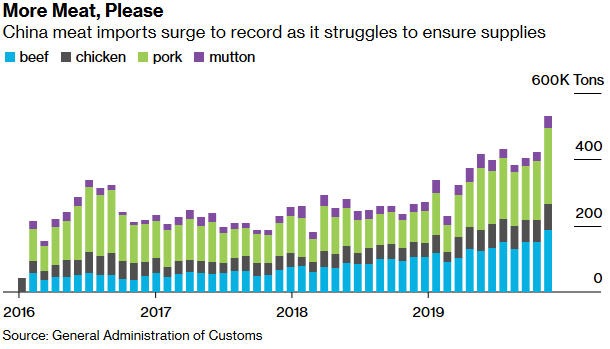
It’s Time to Pig Out on China
Forget the bull market … it’s time to look at the pig market!
Starting in January, China is cutting import tariffs on more than 850 products. Those products will range from avocados (Do the Chinese do avocado toast too?) to semiconductors to pork.
Diving into a few key numbers: The frozen avocado tariff rate will be slashed from 30% to 7%. (They must eat avocado toast — I’m sure of it. Chinese hipsters for the win!) Frozen pork tariffs will drop from 12% to 8%, and multicomponent semiconductor tariffs will be dropped to zero.
Yes, zero. Nada. Nothing. What’s more, China also plans to lower import tariffs even further on additional information technology products in July next year.
Why the sudden shift? China says it’s to “increase imports of products facing a relative domestic shortage, or foreign specialty goods for everyday consumption.” In other words, China’s economy is struggling … and it’s using the cover of the “phase 1” trade agreement to ease those struggles.
The Takeaway:
Many of you probably immediately saw the zero tariffs on semiconductors and saw that as the biggest opportunity. But there’s an even bigger tariff reduction to pig out on.
Right now, China suffers from a massive pork supply gap. The country’s domestic pork supply was devastated by a severe outbreak of African swine flu. The disease has roughly halved China’s pork production since the outbreak began in August last year.
In November, Chinese pork imports surged 150% from the year prior. That’s a lot of bacon … seriously.
Now, this may not seem like a big deal to too many of you, but pork in China is the equivalent of beef in the U.S. Right behind chicken, pork is China’s staple meat product.
The Chinese government even issued several measures to boost domestic pork production and combat the swine flu. But it can’t make up for all of that loss, as today’s tariff news indicates.
So, with China already on the hook for billions in U.S. agriculture imports under the phase 1 trade deal, pork could be chief among those imports for the first half of 2020.
As such, investors might want to look toward key U.S. pork producers, such as Tyson Foods Inc. (NYSE: TSN), Archer-Daniels-Midland Co. (NYSE: ADM) and Pilgrim’s Pride Corp. (Nasdaq: PPC). These companies could see a notable bump as China lowers tariffs and purchases more pork to deal with the fallout from its swine flu debacle.
Editor’s Note: Great Stuff will be chilling with family for the holidays. We suggest you do the same. So, in the interest of not spamming your inbox, there will be no issues of Great Stuff for the next two days. Think of it as our gift to you. We’ll see you again on Thursday. You’re welcome. Merry Christmas!

Good: Boeing Bails on Muilenburg

Boeing Co. (NYSE: BA) CEO Dennis Muilenburg is gone. Kaput. He joins the choir invisible and is now an ex-CEO.
After the company paused 737 Max production and said it would miss its internal deadline for the plane’s recertification, we all knew something had to give. And poor Dennis is getting the boot — effective immediately.
Not to worry: Boeing Chairman David Calhoun is hopping into the pilot’s seat on January 13. Until then, Chief Financial Officer Greg Smith is serving as interim CEO.
In a statement, Boeing said: “We believe this decision is least disruptive to maintaining long-term production system and supply chain health. This decision is driven by a number of factors, including the extension of certification into 2020, the uncertainty about the timing and conditions of return to service and global training approvals, and the importance of ensuring that we can prioritize the delivery of stored aircraft.”
In short, Boeing believes axing Dennis is the best way to restore some faith in the company and save face with both investors and creditors.
It’s a step in the right direction at the right time.
Better: Pass the Chips

You didn’t think that “zero tariffs on Chinese semiconductor imports” line would go completely unnoticed, did you?
Semiconductor stocks are gaining ground today, and Advanced Micro Devices Inc. (Nasdaq: AMD) leads the way with fresh all-time highs. But renewed optimism from China is just the tip of the iceberg for AMD.
The company was the focus of a bullish note from Wedbush Securities on Friday. Analyst Matt Bryson reiterated his outperform rating and boosted his price target to $51.50 from $39. That’s more than 14% above AMD’s current trading range.
According to Bryson, AMD will gain more market share in the next two years … at Intel Corp.’s (Nasdaq: INTC) expense. “With AMD executing and Intel struggling, we expect the dynamic of share shift towards AMD will continue through at least 2020 and into 2021,” Bryson told clients.
Meanwhile, FactSet named AMD the best-performing stock in the S&P 500 Index recently. Heading into the end of the year, AMD is up more than 138% year to date, compared to the S&P 500’s gain of about 29%.
With China dropping tariffs on semiconductors to zero, this could be an opportunity for AMD to gain additional market share in a big way.
Best: The Stock of the Decade!

While AMD has claimed the title “Stock of the Year,” Netflix Inc. (Nasdaq: NFLX) beat that title tenfold.
According to CNBC, if you had placed a $1 million bet on Netflix back on January 1, 2010, you’d be sitting on about $43 million today. (Take that, short sellers!)
That’s an insane return of 4,181%. It blows past all current S&P 500 members with ease. The index itself is only up a mere 189% in the past decade.
Interestingly, Netflix faces the same questions now as it did 10 years ago. How does the company deal with the threat of competition?
Back in 2010, streaming competition was practically nonexistent. However, Netflix now faces a whole host of lower-cost competitors, including offerings from Apple Inc. (Nasdaq: AAPL) and The Walt Disney Co. (NYSE: DIS).
Before, Netflix could hide behind the steep costs of getting into the streaming market. But now, competitors like Apple and Disney have gobs and gobs of cash to throw at the market. What’s Netflix’s answer this time? Global diversification.
As its recent subscriber numbers show, Netflix is Mr. Worldwide. In fact, the company has more overseas subscribers than most of its competitors do stateside. That early edge outside the U.S. should sustain Netflix’s lead for some time … and it might even be enough to make NFLX the stock of the next decade.

I get the feeling that some of you aren’t taking me seriously on China’s pork problem. So, how about a chart to illustrate the issue?

See all that green? That’s Chinese pork imports. And they just hit a record high.
A few more side notes in favor of researching U.S. pork producers: First, European supplies are drying up. Second, China is cracking down on meat hoarding — yes, this is a thing. Finally, the country is also boosting sales from reserves. You’ve heard of oil reserves? Now, there are pork reserves.
I’m simultaneously fascinated and disgusted with this story. Pork reserves and meat hoarding? If it makes us money by investing in pork producers, I’ll try to stomach it.
Great Stuff: Happy Holidays!

Whether it’s Christmas, Hanukkah, Yuletide or a Festivus for the rest of us … Great Stuff wishes you the best this holiday season!
Remember, the stock market closes early tomorrow and is closed all day on December 25.
Also, Banyan Hill is closed for the next two days. As my gift to you, Great Stuff is going on hiatus for two days … so, no need to check your inbox or the Great Stuff website.
Just sit back and relax with loved ones, and enjoy the break.
We’ll see you again after the break … hopefully with shiny new toys!
Until next time, good trading!
Regards,

Joseph Hargett
Great Stuff Managing Editor, Banyan Hill Publishing









